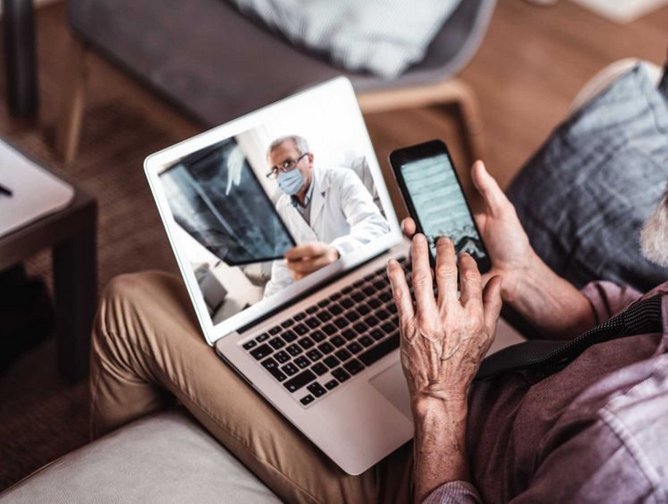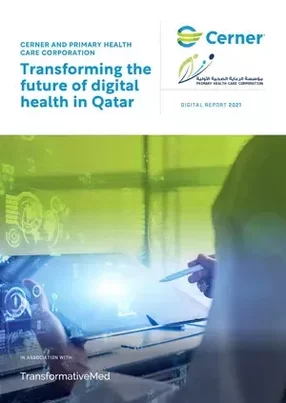Cerner: Transforming the future of digital health in Qatar
When Covid-19 arrived in Qatar, the state’s Primary Health Care Corporation (PHCC) was well-prepared to protect the people most at risk from the virus and keep transmission rates low. Thanks to their electronic health record (EHR) system, they could quickly identify patients with underlying health conditions that would make them more vulnerable to the disease and limit their access to health centers where they could be put at risk.
Their EHR is provided by Cerner, who mark their 30th anniversary operating in the Middle East this year. Established in seven countries across the Middle East, they cover approximately 30 million (or 27 million+) unique patients, and have been voted “Best in KLAS” for Acute Care EMR (Middle East/Africa) for the last three years.
"We had a huge advantage by having data already recorded in our databases thanks to Cerner," explains Alexandra Tarazi, Executive Director of Health Information and Communication Technology at PHCC. Virtual consultations, a medication delivery service via WhatsApp, and drive-through testing facilities were set up “at the speed of light" she says. "What usually takes months was delivered within weeks, and that's thanks to our partners, who sat down with us to design the services and find optimal solutions."
Adrian Dey, General Manager for Cerner Qatar, explains that much of their early work had been establishing a common centralized EHR across the public health system in Qatar. "Since 2011 along with HMC and PHCC we've rolled out a single EHR across 80 percent of healthcare within Qatar," he says. "We've helped integrate care across 13 hospitals and 27 primary healthcare institutions. As we continue our journey together, our attention has shifted, to drive how our systems are used by the clinical community in a more optimal manner to create the best outcomes for the individual as well as those institutions."
"There's a common understanding now that individuals no longer receive their health services and care from one institution within the community in which they live,” Dey says. “I think we will start to see a prevalence of consumerism, where individuals as consumers of health and care are going to be more informed to make better personal decisions based on performance, convenience and access. To facilitate that, you've really got to open things up, and Cerner is at the forefront of pushing for open standards and sharing data across all platforms, giving access to that data to clinician, patients, researcher and developers.”
This is illustrated in part by the rise in health apps for both the provider and for the consumer, as people take greater control over their health and care. In turn, this is creating a wealth of additional data to make more informed decisions. “We are seeing additional data points - whether that's through wearables or devices at home, or social determinants of health – that are now forming a valuable factor within someone’s personal health record,” Dey says.
Big data analytics, machine learning, and artificial intelligence will be key to help clinicians classify all this new information. Veronica Freeman, Health Care Executive at Cerner explains: “If we begin with the patient accessing clinical data through the patient portal to facilitate syncing with their Apple Watch and also being able to enter glucose results, the provider is able to see that information in the medical record. This brings real time data to the provider for early intervention which ultimately leads to better outcomes.”
The data mentioned previously can be the catalyst for conversations with the patient about smoking cessation, exercising, or other forms of preventative care before the patient arrives at the health center. “This data is also available for other providers across the continuum, of care which can be analyzed with AI or machine learning, to look at Qatar’s patient populations. For instance, do I have a cohort of patients that might be in downtown Doha with high glucose, or with more smokers, as opposed to in a different area?” This is one benefit of having a country-wide EHR and data in a single repository.
Preventative care and managing illness at home are among the key priorities PHCC has identified to improve the health of the Qatari population with technology. These are aligned with Qatar's National Health Strategy. "A large area is chronic disease management from home,” Tarazi says. “We believe we can do much better using technology, mobile apps and different types of wearables to achieve better outcomes”.
"There is also a large area that sort of went to sleep during the pandemic, which is wellness; we intend to launch digital fitness services to support our wellness activities as soon as the pandemic is under control. There is a lot of work to do in smoking cessation. Young mothers can be better served better by making digital services available over mobile devices in terms of consultations and support for pregnancies and baby wellness."
During the pandemic PHCC launched a number of online services, which have had high levels of engagement from users. "Before the pandemic we had about 50,000 patients using our patient portal," Tarazi says. "This has grown to almost half a million people now. Launching e-services to the public helped us enormously to conduct day-to-day activities from home. We launched our new website - eight months ahead of time - enabling online registration, so people don't need to come to the health centers to register themselves or a new family member. They can request an appointment or change family physician and health centers remotely by submitting the right documents.”
In some respects, Covid-19 merely sped up plans they already had in place; virtual consultations were originally set to be introduced later on in 2020, and the medication delivery service was set to be rolled out through a mobile app.
Now that Qatar’s Covid-19 vaccination programme is in progress, there are vaccination clinics at each of PHCC’s centers, along with a mass vaccination clinic at the Qatar Exhibition and Convention Centre. Patients are able to visit the online portal, fill out a questionnaire, book an appointment and later access their results. “For patients to log in, look at their results and print out their certificates is an enormous improvement, and obviously for health information management this is a huge advantage,” Tarazi adds.
"The need for e-services is enormous now. We are undergoing a total digital transformation of the way we deliver administrative and certain clinical services to the public. Areas like physiotherapy and dermatology, and even dentistry opened their services to virtual consultations, and there's been great acceptance. Patient engagement is key, and partners like Cerner help us to make the technology more patient-friendly and capable of connecting to our main data sources in clinical information systems."
Another major project is the upcoming FIFA World Cup which will be held in Qatar next year, and PHCC is providing services at stadiums and throughout the country. "PHCC currently manages 27 health centers, we intend to open three more in the catchment areas of those facilities and launch a number of electronic services to support the World Cup in the coming months,” Tarazi says.
"Major planning operations will be deployed across the country to support FIFA, and we're working very closely with secondary care providers Hamad Corporation to design the services. We're really looking forward to this fantastic piece of work."




